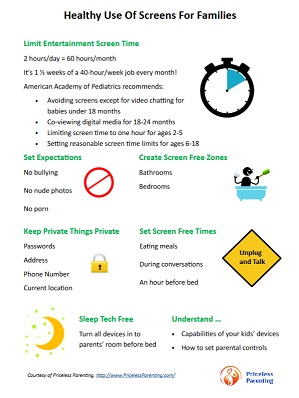Limiting Screen Time for Your Kids
by Kathy Slattengren, M. Ed., Priceless Parenting (sign up for monthly parenting newsletter and receive 20+ printable charts for kids and parents)
(listen to article read by the author)

Do you feel your kids are spending too much time watching TV, playing video games and being on the computer or their phone? Do ever find it challenging to get them to turn off the TV or digital device and go outside to play? If so, join the crowd!
How much time are kids really spending with media?
According to the American Academy of Pediatrics (AAP), “children are spending an
average of seven hours a day on entertainment media, including televisions, computers, phones and other electronic devices”.
Wow! That doesn't leave much time for playing outside! Where did they learn to spend so much time watching TV and playing on the computer?
It seems our kids may be picking this behavior up from us! Researchers have found that on average parents spend even more time than their children with digital devices. If we want our kids to reduce their media time, we’ll have to start by setting a good example.
Why should we be concerned with limiting screen time?
Parents are raising a lot of concerns about how media is affecting their children. One mom complained that her 8-year-old son was having meltdowns whenever it was time to shut off his video games. A dad discussed the negative attitude he was seeing from his daughters - something he believes they are picking up from watching TV. Another couple shared that their daughter was more interested in playing with her Nintendo DS while on vacation than going outside to play on the beach with her cousins.
Preschool teachers are reporting more aggressive behavior in their classrooms due to what the children are watching on TV.
Many believe that children are acting out the violence they've seen.
An AAP article titled "
How Media Can Affect Children's Health" states
"Research has found that media can influence children’s beliefs and behaviors in terms of violence and aggression, sex, substance abuse, obesity and eating disorders. Heavy television viewing has been linked with attention-deficit disorder and diminished academic performance, as well as hypertension, asthma, sleep disorders, mood disorders, psychological distress and depression."
How much screen time is reasonable?
The AAP recommends avoiding digital media except for video chatting for babies 0 - 18 months. This is primarily due to the fact that very
young children need to interact with people in order to learn. It’s the back and forth interaction with real people that is essential for learning.
From 18 months to 24 months they recommend any screen usage involve co-viewing high quality programs/apps with caregivers.
This one page flyer explains
how too much screen time hurts babies.
For children
ages 2 to 5, the AAP suggests limiting entertainment screen time -- including TV, video games and computer use -- to one hour a day.
They also recommend setting reasonable screen time limits for kids ages 6 - 18.
This one page flyer lists
warning signs that a child is getting too much screen time.
How do these recommendations compare with the amount of daily screen time your children typically have? Most parents will find that their children are far above the recommendations. Being aware of the problem is the first step in making some improvements.
What are signs that digital usage is becoming a problem?
If your children are exhibiting these types of behaviors, it's time to think about reducing the time they spend on media:
- Spending less and less time with family and friends
- Difficulty focusing on the present moment due to craving video game or cellphone
- Developing health issues such as Carpel Tunnel Syndrome, eye strain, weight gain, backaches
- Withdrawing from sports, hobbies and social interactions
- Losing sleep due to gaming, texting
- Acting irritable or discontent when not using digital items
- Declining grades in school, missing school
- Talking and thinking obsessively about the digital activity
- Denying or minimizing any negative consequences
When you realize your children's media usage is having a negative impact on them, you need to set some limits despite their protesting. If you feel your child is addicted to video games and will react extremely to having limits set, it is wise to seek help from a professional counselor or psychologist.
It is also wise to keep TV, internet and other digital media out of your children's rooms. When these devices are in your children's bedrooms, it’s much more difficult to monitor what's going on.
What are ways to limit media usage?
If your children are old enough to discuss the issue, sit down as a family to talk about it. State your concerns and brainstorm ideas on how your family could limit media usage.
These are some ideas other families have used:
- Declare a "screen free day" once a week where nobody watches TV, uses the computer or plays video games.
- Install monitoring software on digital devices that allow you to set limits.
- Track daily media usage and stop using media after the allotted time is up.
- Set timers to go off after a media time limit has been reached.
- Turn off digital devices during meals.
- Move TVs and computers out of bedrooms and into common areas.
- Plan more activities to do together like bike rides and hikes.
Researchers have found that children whose parents make an effort to limit media use spend less time with media than their peers.
Healthy Children offers a free tool for creating your own
Family Media Plan.
Although your children may resist your efforts to reduce their screen time, the long term benefits are worth it!
Note: For additional information, visit the
Resources for Parenting Digital Kids page.